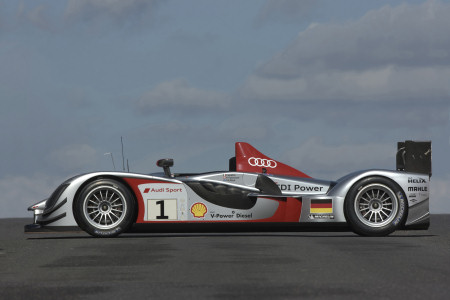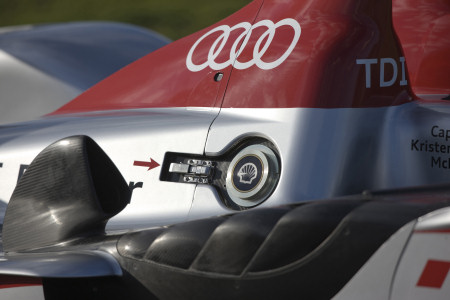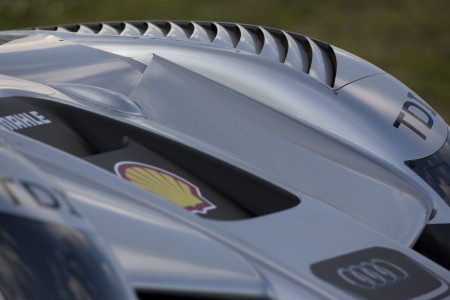The Way It Is/ Grappling with the fear of technology
by Gordon Kirby As everyone knows, this year’s American Le Mans Series is a bit of a let-down, lacking the factory Audis and Penske Porsches which brought so much to the show over the past few years. We can only thank the lord that Audi and Peugeot added some much-needed quality, technology and class to last month’s Sebring 12 Hours with their superb turbo diesels and equally excellent teams. Everyone hopes that after Le Mans Audi will decide to return to the USA for this year’s last two ALMS races at Laguna Seca and Road Atlanta and possibly run the full season again in 2010. At Sebring, Audi’s motorsports boss Dr. Wolfgang Ullrich left the door open to the possibility.
As everyone knows, this year’s American Le Mans Series is a bit of a let-down, lacking the factory Audis and Penske Porsches which brought so much to the show over the past few years. We can only thank the lord that Audi and Peugeot added some much-needed quality, technology and class to last month’s Sebring 12 Hours with their superb turbo diesels and equally excellent teams. Everyone hopes that after Le Mans Audi will decide to return to the USA for this year’s last two ALMS races at Laguna Seca and Road Atlanta and possibly run the full season again in 2010. At Sebring, Audi’s motorsports boss Dr. Wolfgang Ullrich left the door open to the possibility.
"We have a program for 2009," Ullrich said. "This is fixed and there is no ALMS in it. The next season is far away. But there is still a good reason for us to race in America to support our road cars in the American market."
Meanwhile, Audi and the Volkswagen Group as a whole are among those talking with the IRL about the new two-liter turbo IndyCar formula for 2011 or ’12. Ulrich Baretzky is Audi Sport’s head of engine development and Baretzky is excited about Audi’s conversation with the IRL and the prospect of the company building an Indy car engine for the new formula. For the sake of both the sport and Baretzky, I hope he won’t be disappointed.

© Audi
In fact, a larger debate has been taking place in recent months with many manufacturers and some sanctioning bodies about creating a common base engine for F1, ALMS-type sports cars, Indy cars and possibly World Rally too, designed around small capacity (2 liters or less) turbocharged, four-cylinder engines. The idea was first put forward by FIA technical representative Peter Wright through the SAE’s Motorsports Conference. For his part, Baretzky is delighted that more and more sanctioning bodies are working with the manufacturers to determine their rule packages rather than dictating the rules with little or no discussion with the competing teams or engine suppliers.
"The world has changed," Baretzky grinned. "The time is over when people made rules on their own and waited to see who came to race. Now, whether it’s the ACO and the ALMS, and now the Indy guys, they are coming to us and asking what do you believe is the right way to go in to the next ten years?
"This is completely different than the old way. It’s a revolution and it shows me they have understood what is taking place. This gives a completely new dimension to motor sport to really form the framework that there are no silly rules made which absorb energy for nothing. Let’s focus on what the world needs. This is completely different thinking."
Without doubt Audi is one of the world’s most forward-thinking automobile manufacturers and the company’s brand new R15 turbo diesel LMP1 sportscar must be the most technologically-advanced car racing today. I’ve written a complete technical evaluation of the car for the June issue of Motor Sport and discussed Audi’s commitment to developing new technology in my US Scene column in the same issue. Baretzky says dealing with new technology is the biggest challenge for all automobile racing sanctioning bodies.
"You have to take away the fear of technology," Baretzky emphasized. "The IRL are a little worried about new technology. But you can do a nice motor sport with smaller engines. They don’t know that because they are coming from another world. And of course, for the NASCAR guys the way is the longest because they have such a long way to go. I know they just started last year with unleaded fuel, but every journey starts with the first step.
"What I have learned about Americans is they are very sensitive on money," Baretzky added. "If the spectators don’t come anymore the promoters will think very quickly about how they have to react to make it attractive and socially acceptable. And that’s the key. Not only environmentally, but socially acceptable."
Baretzky is a believer in improving efficiency in all areas and he’s convinced that fuel technology, a subject he’s deeply familiar with, will continue to get better.

© Audi
But Baretzky sees no future in the masses of environmentally unfriendly spent batteries that would be created by fleets of electric cars.
"It’s clear to engineers that electric cars can be worse for the environment," he shrugged.
"This is maybe a point where we really need the politicians and political decisions," Baretzky added. "Bush made a silly decision with a law that requires something like fifty percent of fuel from ethanol in 2020. That would kill the world. Obama has to stop that and he will do that I’m sure."
Many people don’t recognize the contribution companies like Audi are making to improving the environment. Fuel stratified or direct petrol injection (FSI), for example, was introduced by Audi with its R8 at Le Mans in 2001 and the system is now standard in most Audi production cars.
"We are saving the world more than we are killing it," Baretzky declared. "I made a presentation last year about the R10 and its efficiency and when we were finished a young girl, an ecologist, came to me and said, ’How can you sleep at night with all the CO2 your engines are producing?’ And I said, ’I’m sleeping extremely well and I can tell you why.’
"In 2001 we introduced FSI technology at Le Mans. The benefit was an increased performance and reduction in consumption by ten percent. In 2006 the VW Group introduced this technology over all its gasoline engines and 3 million of these engines have been sold each year. If you calculate that the average car goes 10,000 kilometers per year with a reduction in consumption by ten percent thanks to FSI then in three years more than 3 billion liters of fuel have been saved. So now you know why I sleep well.
"We have to be aware of that and we have to tell it to the public," Baretzky added.

© Audi
"Altogether, everything we’ve seen over the past few years has created a mentality, specifically in America, that energy and mobility has a higher value than it had before," Baretzky said. "In the bad, old days gasoline was for free, more or less. Nobody cared when a gallon cost $1.40.
"America lost its feeling for energy when central heating came. Before that you had to go down into a cave and bring up the coal. You felt the use of the energy and now you just turn the switch or it operates automatically and you’re warm or cold. I believe this mentality is about to change in America much more quickly than you expect. It’s really fascinating.
"It’s my personal opinion that it will bring a new economic cycle. Instead of selling cars, which they can’t because they don’t do a good job of building them, they will make technology for energy-saving and things like that. It will be a huge market."
All this strikes a sharp contrast to the feeble excuse for thinking that’s trickled out of Detroit over the past forty years. Equally important is the fact that it’s what motor racing was always about--improving the breed rather than building fleets of spec cars. As I’ve written repeatedly in this space and elsewhere, if America’s sanctioning bodies want to recreate the sport as a driving force for 21st century technology they need to learn the lessons provided by Audi’s Le Mans cars and put that kind of progressive thinking into action.
Auto Racing ~ Gordon Kirby
Copyright 2009 ~ All Rights Reserved
Copyright 2009 ~ All Rights Reserved
Top of Page